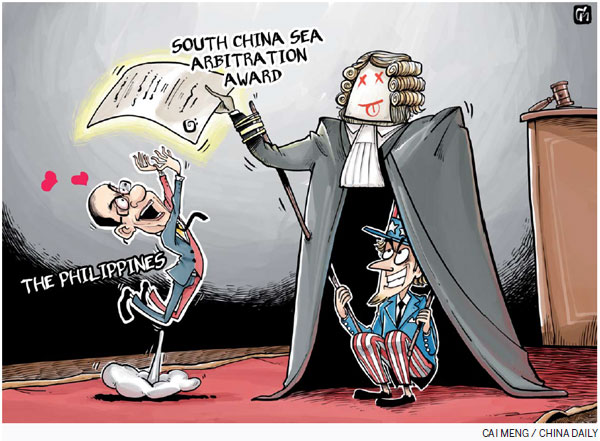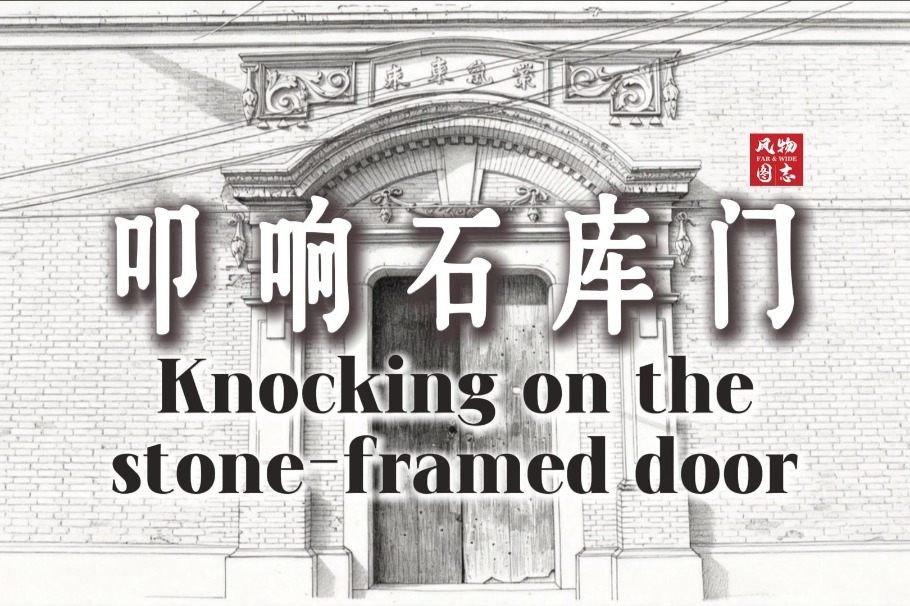Illegal, illegitimate and invalid

Moves by the Philippines may be noisy and high profile, but they can't stand against historical facts and international law
If I had to choose three words to reflect my views on the arbitration over the South China Sea disputes unilaterally filed by the Philippines against China, they would be: illegal, illegitimate and invalid.
And China's position is firm and clear: non-acceptance.

Not surprisingly, some in the West have again pointed their fingers at China and accused the country of "thumbing its nose at international rules". I cannot but dismiss these allegations and vilifications as groundless and unjustified. It is the Philippines, and some other forces, that are acting against international law. China is not.
Although the Philippines has struggled to appear that it only requested the arbitral tribunal to decide on the legal status of some features in the South China Sea, it failed to cover up the essence that it's about territorial sovereignty and maritime delimitation. Nor can it hide its obvious purpose of denying China's sovereignty over Nansha Islands and emboldening its illegal occupation from China.
It's common knowledge that territorial issues are subject to general international law, rather than the United Nations Convention on the Law of the Sea, and that disputes concerning maritime delimitation are excluded by China in its 2006 declaration on optional exceptions on Article 298 of UNCLOS.

Chris Whomersley, a former deputy legal adviser at Britain's Foreign and Commonwealth Office, made a good point when he said there was "no precedent for an international tribunal deciding upon the status of a maritime feature when the sovereignty is disputed". Simply put, the Philippines' initiation of the arbitration is in total disregard of international law and the spirit of UNCLOS, and undermines the authority and sanctity of the convention.
Settlement of territorial sovereignty disputes through bilateral negotiations is an established international practice and in full compliance with the principles and spirit of the UN Charter. If memory serves me correctly, China and the Philippines were the first countries in the region that agreed to resolve the relevant disputes through negotiation.
In June 1986, during a meeting with Jose P. Laurel, vice-president and foreign minister of the Philippines, Chinese leader Deng Xiaoping put forward the principle of shelving disputes and seeking joint development. This was well received by the Philippine side. The two countries later entered into a number of agreements on the option of bilateral negotiations to resolve disputes.
The same spirit was enshrined in the Declaration on the Conduct of Parties in the South China Sea, a document of far-reaching historic significance agreed on by China and the Association of Southeast Asian Nations, including the Philippines.
I had the pride of helping to draft the declaration and a few other agreements. For me, the thrust of these agreements cannot be clearer: disputes shall be settled in a peaceful and friendly manner through consultations on the basis of equity and mutual respect, and third-party dispute settlement, including arbitration, is explicitly excluded.
To my shock, the Philippines turned its back on the commitment it made and unilaterally initiated the arbitration by abusing the UNCLOS procedures.
Talking about respecting international law, we need to remind ourselves of the long established principle of Ex injuria jus non oritur: legal right or entitlement cannot arise from an unlawful act, and that the UNCLOS does not allow initiation of arbitration as in the Philippines' case.
As mentioned, settling disputes through negotiation is the means China and the Philippines had agreed in a series of bilateral documents and the declaration. In the worst-case scenario, if a dispute arises between states concerning the interpretation or application of the convention, according to the UNCLOS, "the parties shall proceed expeditiously to an exchange of views". Yet the Philippines never exchanged views with China concerning its arbitration submission. The so-called disputes in the arbitration are sheer fabrication, and the whole thing was illegally imposed on China.
Again, it's crystal clear that the Philippines and the arbitral tribunal are making a mockery of international law, and their act will not have any lawful and legal effect.
The arbitration does more harm than good to good-neighborliness, and peace and stability in the South China Sea. Since the end of the Cold War, the general trend in the region has been to seek new concepts and approaches to promote peace and prosperity. It's only in recent years that such a positive trend has been interrupted, if not obstructed.

People may have different observations of the root cause of the present fluid situation. But one has to admit that the reaction from the other side of the Pacific to the positive development and achievements in Southeast Asia, especially the launching of the "Asia-Pacific rebalancing" in 2010, has had a profound impact on the region.
One needs to also acknowledge the fact that as a permanent member of the UN Security Council, China has always stood for safeguarding peace and stability and promoting cooperation and prosperity, and is fully committed to resolving disputes peacefully through consultations and negotiations, in accordance with international law and the spirit of the declaration.
In this regard, I'm particularly impressed by the Joint Statement on Promotion of International Law signed on June 25 by China and Russia, as it reaffirms the principle of peaceful settlement of disputes.
Coming back to my point, non-acceptance of and non-participation in the arbitration is the move China has taken to safeguard the international rule of law. The so-called arbitration is in itself a breach of international law. It only serves to impair regional efforts to build confidence and trust and properly settle territorial sovereignty disputes.
Many countries as well as experts and scholars have deplored the moves by the Philippines and the tribunal as an obvious intervention in the sovereignty of countries in the region, which would only exacerbate bad will between countries. The illegal, illegitimate and invalid arbitration initiated by the Philippines and the tribunal may be noisy and high profile, yet it can't stand against historical facts, international law and the trends of the times.
It is nothing but a farce in passing. As Wang Yi, China's foreign minister, said early this year on the South China Sea issue: "History will eventually prove who is just passing through, and who is the real master."
The author is head of the Chinese Mission to the European Union.
(China Daily European Weekly 07/15/2016 page11)
Today's Top News
- Group of Friends a key step in global governance
- Report reveals US blunders in Afghanistan
- President of Uruguay begins visit to China
- The logic behind China's internal impetus
- AI push moves innovation into everyday life
- APEC must turn turbulence into traction






























